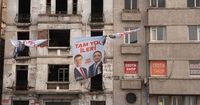On Friday, August 15, 2025, Turkish authorities intensified their crackdown on the country’s opposition with the arrest of Inan Guney, the mayor of Istanbul’s Beyoglu district, along with dozens of other officials. The sweep, which resulted in the detention of 44 people, including Guney’s bodyguard, advisor, and other aides, marks the latest escalation in a months-long campaign targeting the main opposition Republican People’s Party (CHP). The operation, announced by the Istanbul Chief Public Prosecutor’s Office and widely reported by state and independent media alike, has reignited fierce debate about the state of democracy and the rule of law in Turkey.
The arrests are part of a broader investigation into alleged corruption within the Istanbul Metropolitan Municipality, a stronghold of the CHP. According to TRT Haber, those held in this latest operation are suspected of involvement in fraudulent activities at companies linked to the municipality. Arrest warrants were issued for a total of 44 people, with at least 40 detained as of Friday. Beyoglu Mayor Inan Guney is now the 16th mayor to be taken into custody in what has become a sweeping purge of opposition figures since last October. In less than a year, more than 500 people have been detained under similar allegations.
This crackdown has not been limited to lower-level officials. Ekrem Imamoglu, Istanbul’s mayor and the CHP’s presidential candidate for the 2028 elections, has been imprisoned since March 19, 2025. Imamoglu, widely regarded as President Recep Tayyip Erdogan’s most formidable political rival, is currently under investigation for both corruption and links to terrorism. His arrest earlier this year triggered the largest protests in Turkey since 2013, with demonstrators pouring into the streets to denounce what they see as the government’s assault on democratic institutions. According to Anadolu Agency, Imamoglu and his supporters have repeatedly denied the charges, claiming they are politically motivated attempts to sideline the opposition.
CHP leader Ozgur Ozel has been especially vocal in his criticism of the government’s actions. On Friday, Ozel wrote on X that, after 149 days, the judiciary has yet to produce an indictment against Imamoglu. “Because they only have slanderous accusations like ‘I heard that’,” Ozel said, dismissing the charges as baseless. He further described the wave of arrests as “vengeance which aims to cover up the damage caused (to the country) by the AKP gang,” referring to Erdogan’s Justice and Development Party (AKP), which has ruled Turkey since 2022. Ozel’s comments echo those of other opposition figures, who argue that the legal campaign is designed to undermine the CHP’s growing influence, especially after its decisive victories in the 2019 and 2024 municipal elections.
The government, for its part, insists that the judiciary is acting independently and that the courts are not subject to political interference. President Erdogan has described the operation as targeting “a corrupt network that is like an ‘octopus with wings that extend to other parts of Turkey and beyond’.” Turkish officials maintain that the investigations are necessary to root out wrongdoing and restore public trust in local government. The Istanbul Chief Prosecutor’s Office stated in its announcement that the detentions are part of an ongoing effort to address corruption within the Istanbul Metropolitan Municipality.
Yet, critics remain unconvinced. Many point to the scale and timing of the arrests as evidence of political motivation. Since March 2025, hundreds of party members, mayors, and city administrators from CHP-led municipalities have been swept up in multiple corruption and terror investigations. Nine of Istanbul’s 26 CHP district mayors have been arrested and imprisoned since October 2024, most on charges they vehemently deny. CHP mayors from other cities have also been detained. According to Reuters, this unprecedented wave of arrests has disproportionately targeted municipalities that flipped to the opposition in recent years, fueling speculation that the government is using the judiciary as a tool to neutralize its main rivals ahead of the next national elections.
The political stakes are high. Although presidential elections are not scheduled until 2028, there is widespread speculation that Erdogan may seek early re-election by pursuing a constitutional amendment that would allow him a third term. The opposition’s recent gains at the municipal level have rattled the AKP, which lost control of Istanbul and several other major cities in 2019 and suffered further setbacks in the 2024 local elections. Analysts cited by Balkan Insight and other outlets believe that the government’s aggressive tactics are aimed at reversing these losses and reasserting control over urban centers that have become bastions of opposition support.
Amid the ongoing crackdown, an unexpected political realignment occurred on Thursday, August 14, 2025, when Ozlem Cercioglu, the long-serving mayor of Aydin province on the Turkish riviera, announced her defection to the AKP. Cercioglu, who had just won her third term as mayor with more than 50 percent of the vote, brought three district mayors and 13 city councillors with her, effectively shifting control of Aydin to the ruling party. CHP leader Ozgur Ozel claimed that Cercioglu’s move was the result of government threats. “Clearly, they told her: ‘Either join our party or go to jail,’” Ozel told reporters. The AKP, meanwhile, celebrated the defection as a sign of its enduring appeal and ability to attract talent from across the political spectrum.
The government’s assertion that the courts are acting independently has done little to quell domestic and international concerns about the erosion of democratic norms in Turkey. Human rights groups and foreign governments have voiced alarm over what they describe as a pattern of politically motivated prosecutions, arbitrary detentions, and the stifling of dissent. The jailing of Imamoglu and other prominent opposition figures has become a rallying point for critics who accuse Erdogan of steering the country toward authoritarianism.
Despite the mounting pressure, the CHP and its allies continue to deny all allegations of wrongdoing. They maintain that the charges are part of a broader campaign to eliminate a democratic alternative and silence dissent. As investigations and arrests proceed at full speed, the future of Turkey’s opposition—and the country’s broader political trajectory—remains uncertain. With more than 500 people detained in less than a year, and the specter of further arrests looming, the struggle for control of Turkey’s major cities has become a flashpoint in the ongoing battle over the nation’s democratic identity.
As the dust settles from the latest wave of arrests, both sides remain locked in a high-stakes contest that will shape Turkey’s political landscape for years to come.


